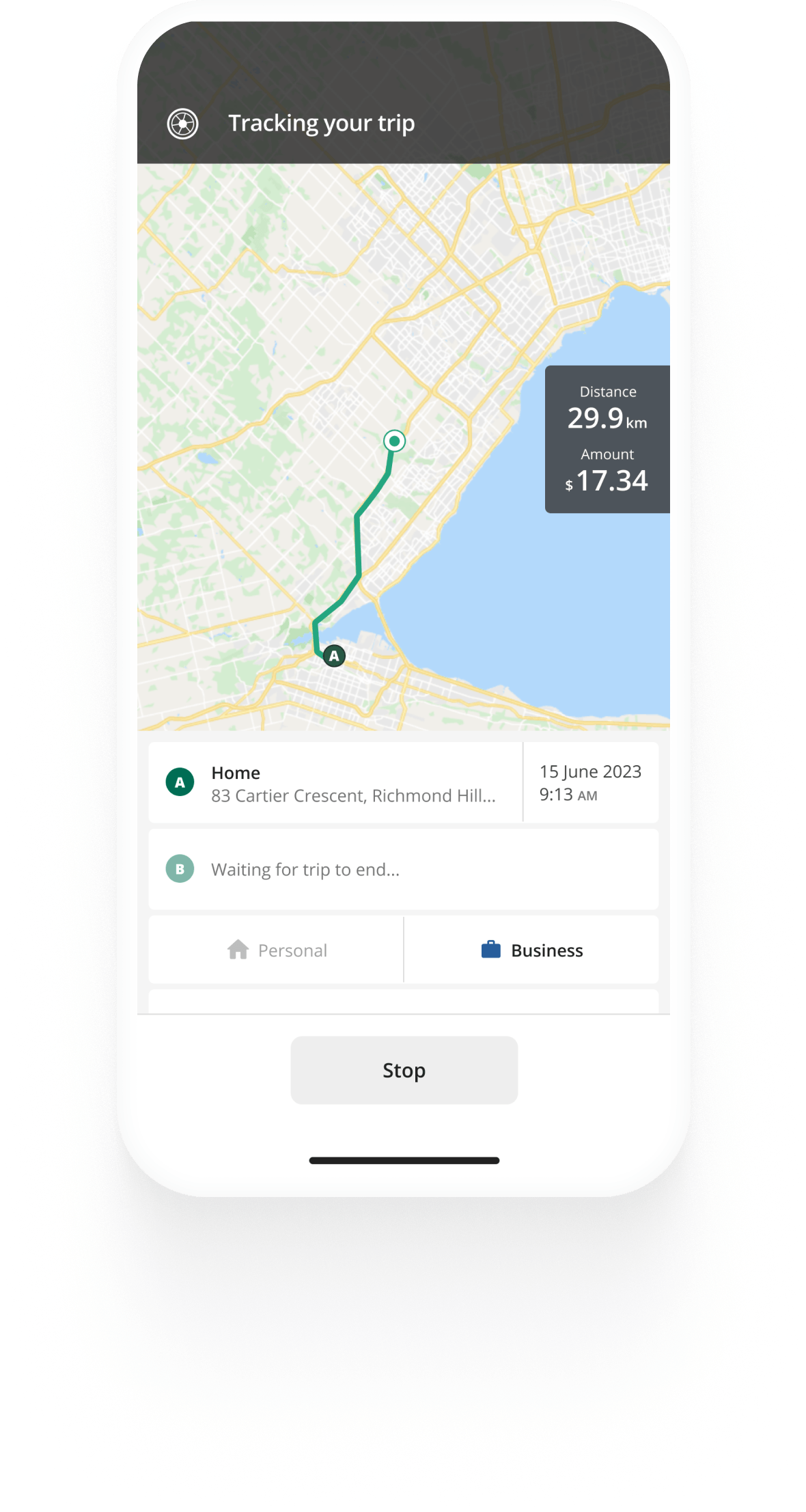Track mileage automatically
Get startedSmall Business Tax Deductions in Canada
In this article
When you run a small business, you can claim certain expenses when you file your taxes. These allowable expenses may help to reduce your tax bracket, and you may owe less tax to the Canada Revenue Agency (CRA).
The business expenses you claim must be related to earning income for your small business and can’t be personal expenses. Be reasonable about the tax deductions you’re claiming, and keep a copy of your receipts.


Track business driving with ease
Trusted by millions of drivers
Automate your logbook Automate your logbook

Automatic mileage tracking and CRA-compliant reporting.
Get started for free Get started for freeCommon small business tax write-offs
Below you’ll find the tax-deductible items for small businesses.
Office expenses
Capital cost allowance
You can claim capital cost allowance (CCA) on business assets that depreciate over time. This includes buildings, furniture, appliances, equipment, and vehicles.
Office expenses
Small items such as paper, pens, paper clips, stationery, stamps, and envelopes are considered office expenses. Don’t include office furniture such as desks, chairs and filing cabinets, as they are capital expenditures. Claim those items under the capital cost allowance.
Prepaid expenses
These are assets paid in advance of using them. This may include insurance, advertising, rent or office equipment and supplies.
Shipping
You can deduct delivery, freight and express costs related to your business.
Supplies
You can deduct supplies that were used in your business to provide goods and services. For example, cleaning supplies that a housecleaner uses or tools used at a dentist's office.
Start-up costs
You can claim expenses that were incurred before you opened your business. However, you can only claim expenses if you operate your business in the fiscal period that the expense was incurred. Check the CRA website for additional rules as claiming start-up costs can be tricky.
Property expenses
Business-use-of-home expenses
You can deduct a certain percentage or square footage of your home that you use for work purposes. Heat, electricity, rent, mortgage interest, home insurance, maintenance, and property taxes are allowable expenses.
Insurance
This includes the commercial insurance premiums paid on buildings, machines and equipment to operate your business.
Maintenance and repairs
The labour and material costs to maintain or repair the property used for your business. You can’t deduct your own labour costs. If it has capital costs, it should be claimed under the capital cost allowance. If they pertain to your home, claim it as a business-use-of-home expense.
Property taxes
The property taxes you paid for the land or building your business operates. If it’s part of your home, deduct it under the business-use-of-home expense.
Rent
This can be rent paid for your office or a property where your business operates. If you’re deducting the rent that’s part of your home, claim that under the business-use-of-home category.
Telephone and utilities
You can claim telephone and utilities (gas, oil, electricity, water, and cable). If these costs are related to your home, you can deduct them from the business-use-of-home section.
Food and travel expenses
Convention expenses
You can deduct up to two conventions per year that are related to your business. If meals are included, you can claim 50% of the amount.
Motor vehicle expenses
You can deduct car expenses related to your small business, such as auto insurance, maintenance and repairs, leasing costs, and license fees. We've got more details on the different methods in this separate guide on vehicle expenses.
Fuel costs
This includes the fuel (gas, diesel, and propane), motor oil and lubricants used for business purposes.
Meals and entertainment
You can claim 50% of your food and beverage costs, along with entertainment expenses (such as taking a client to lunch or to a sporting event).
Travel
When travelling for business purposes, you can typically deduct 50% of your meals, hotel accommodations, and transportation costs.
Employee expenses
Salaries, wages and benefits
This includes gross salaries, Canada Pension Plan (CPP)/Quebec Pension Plan (QPP) contributions, employment insurance (EI) premiums, and workers compensation paid to employees.
Private health insurance plans
You can deduct premiums paid to a private health service plan (PHSP) to insure your employees, yourself or your family members.
Allowances or reimbursements
You can claim the allowances or reimbursements you provided to your employees for the use of their own vehicle which they use for work purposes. If you want to know more about the specifics, we have a guide for vehicle allowance for employers.
Professional and administrative expenses
Bad debt
You can claim bad debt for any amount you’re unable to collect, which you included as an accounts receivable and income for the year.
Business tax, fees, licenses and dues
You can deduct annual license fees, business taxes, annual membership dues in a trade or commercial organization, and publication subscriptions.
Interest and bank charges
You’re eligible to claim interest incurred to borrow money or to buy property for business purposes. Check the CRA website for restrictions.
Management and admin fees
You can claim management and administrative fees, including bank charges.
Professional fees
You can deduct legal, accounting and bookkeeping fees for your small business.
Promotional advertising/marketing
You can deduct the cost of advertising in Canadian newspapers, television and radio stations. This also includes registering and hosting your website, and digital advertising.
FAQ

Tired of logging mileage by hand?
Effortless. CRA-compliant. Liberating.
Small Business Tax Guide
- How Much a Small Business Can Make Before Paying Taxes
- Small Business Tax Rates
- GST/HST for Small Businesses
- Small Business Tax Deductions in Canada
- Small Business Tax Credits
- Business-Use-of-Home Expenses
- How Long You Should Keep Business Records
- Managing Prepaid Expenses
- Self-Employed Tax Breaks
- Self-Employed and Small Business Tax Dates